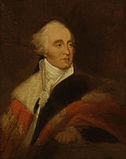
George Grenville was a British Whig statesman who rose to the position of Prime Minister of Great Britain, during the early reign of the young George III. He served for only two years (1763-1765), and attempted to solve the problem of the massive debt resulting from the Seven Years' War. He instituted a series of measures to increase revenue to the crown, including new taxes and enforcement of collection, and sought to bring the North American colonies under tighter crown control.

William Wyndham Grenville, 1st Baron Grenville, was a British Pittite Tory politician who served as Prime Minister of the United Kingdom from 1806 to 1807, but was a supporter of the Whigs for the duration of the Napoleonic Wars. As prime minister, his most significant achievement was the abolition of the slave trade in 1807. However, his government failed to either make peace with France or to accomplish Catholic emancipation and it was dismissed in the same year.

George Nugent-Temple-Grenville, 1st Marquess of Buckingham,, known as George Grenville before 1779 and as The Earl Temple between 1779 and 1784, was a British statesman.

The Speaker of the House of Commons is the presiding officer of the House of Commons, the lower house and primary chamber of the Parliament of the United Kingdom. The current speaker, Sir Lindsay Hoyle, was elected Speaker on 4 November 2019, following the retirement of John Bercow. Hoyle began his first full parliamentary term in the role on 17 December 2019, having been unanimously re-elected after the 2019 general election.
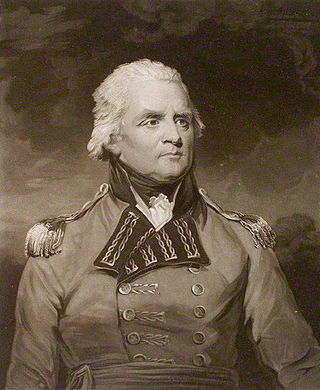
Thomas Grenville was a British politician and bibliophile.

Viscount Cobham is a title in the Peerage of Great Britain that was created in 1718. Owing to its special remainder, the title has passed through several families. Since 1889, it has been held by members of the Lyttelton family.

Charles Watkin Williams-Wynn PC was a British politician of the early- to mid-19th century. He held office in both Tory and Whig administrations and was Father of the House of Commons between 1847 and 1850.

William Pitt the Younger led the government of the Kingdom of Great Britain from 1783 to 1801.
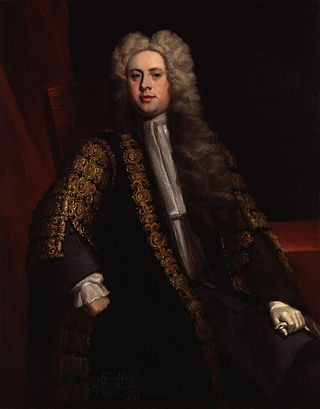
Sir William Wyndham, 3rd Baronet, of Orchard Wyndham in Somerset, was an English Tory politician who sat in the House of Commons from 1710 to 1740. He served as Secretary at War in 1712 and Chancellor of the Exchequer in 1713 during the reign of the last Stuart monarch, Queen Anne (1702–1714). He was a Jacobite leader firmly opposed to the Hanoverian succession and was leader of the Tory opposition in the House of Commons during the reign of King George I (1714–1727) and during the early years of King George II (1727–1760).

Henry Herbert, 1st Earl of Carnarvon PC, known as The Lord Porchester from 1780 to 1793, was a British Whig politician who sat in the House of Commons from 1768 to 1780 when he was raised to the peerage as Baron Porchester. He served as Master of the Horse from 1806 to 1807 in the Ministry of All the Talents headed by Lord Grenville.

George Tierney PC was an Irish Whig politician. For much of his career he was in opposition to the governments of William Pitt and Lord Liverpool. From 1818 to 1821 he was Leader of the Opposition in the House of Commons.
Buckinghamshire is a former United Kingdom Parliamentary constituency. It was a constituency of the House of Commons of the Parliament of England then of the Parliament of Great Britain from 1707 to 1800 and of the Parliament of the United Kingdom from 1801 to 1885.
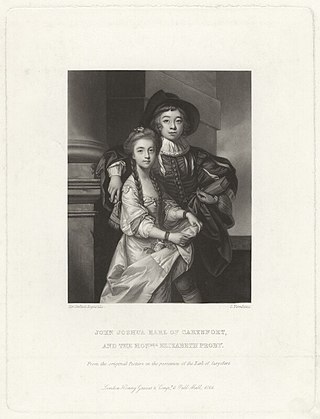
John Joshua Proby, 1st Earl of Carysfort, KP, PC, PC (Ire), FRS was a British judge, diplomat, Whig politician and poet.

The 1868–69 United States Senate elections were held on various dates in various states. As these U.S. Senate elections were prior to the ratification of the Seventeenth Amendment in 1913, senators were chosen by state legislatures. Senators were elected over a wide range of time throughout 1868 and 1869, and a seat may have been filled months late or remained vacant due to legislative deadlock. In these elections, terms were up for the senators in Class 1.

George Neville-Grenville, named George Neville until 1825, was Dean of Windsor in the mid nineteenth century.

Richard Griffin, 2nd Baron Braybrooke was an English politician and peer. He was known as Richard Aldworth-Neville or Richard Aldworth Griffin-Neville until 1797.
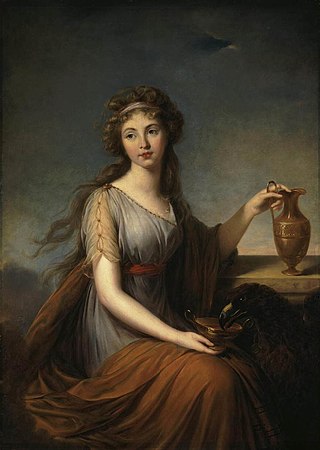
Anne Grenville, Baroness Grenville was an English noblewoman and author, and a member of the Pitt family, which at the time dominated British politics.
Elizabeth Grenville was an English artist and writer. She was the wife of George Grenville, prime minister from 1763 to 1765; the daughter of Sir William Wyndham, a prominent Tory politician; and the mother of William Grenville, prime minister from 1806 to 1807.

The June 1789 election of the Speaker of the House of Commons occurred on 8 June 1789.

